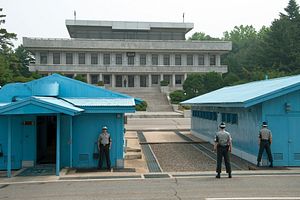On Wednesday, the Chinese foreign ministry issued a statement noting that the top nuclear envoys of both China and Russia met in Beijing on Tuesday to discuss a possible resumption of the Six-Party Talks on North Korea’s nuclear program.
Wu Dawei, China’s top diplomat focused on nuclear affairs, and his Russian counterpart, Igor Morgulov, met in Beijing on Tuesday. According to a statement released by the Chinese foreign ministry quoted by South Korea’s Yonhap News, the two envoys “exchanged views on the resumption of the six-party talks.”
Earlier this month, Wu met with South Korea’s Special Representative for Korean Peninsula Peace and Security Affairs of the Ministry of Foreign Affairs Hwang Joon-kook. That meeting also featured a possible resumption of the Six-Party Talks on the agenda.
The Six-Party talks crumbled almost six years ago, back when Kim Jong-il was still in power in North Korea. Since then, North Korea has two major nuclear tests, one in May 2009 and one in February 2013.
China has been particularly keen to have all parties return to the Six-Party Talks without applying any preconditions on the North Koreans. Japan and Russia remain open to that idea in principle. The United States, however, refuses to return to the negotiating table barring concrete action from North Korea demonstrating a sincere will to work toward denuclearization. South Korea also holds that North Korea must meet certain preconditions and show its sincerity in returning to talks.
Under the leadership of Kim Jong-un, Kim Jong-il’s son, North Korea has grown ever more recalcitrant over its nuclear program. Under Kim the elder, North Korea, South Korea, and the United States managed to sign a 2005 joint statement on denuclearization which included assurances from North Korea that it was “committed to abandoning all nuclear weapons and existing nuclear programs and returning, at an early date, to the Treaty on the Nonproliferation of Nuclear Weapons and to IAEA safeguards.” That document was effectively r rendered hollow by North Korea’s move to conduct tests and pull away from the talks.
Signs in early February 2015 suggested that the United States and North Korea were cautiously exploring the prospect of direct talks. The United States does not engage in bilateral diplomacy with North Korea as that would entail a tacit recognition of North Korea’s nuclear status. Both South Korea and the United States, as a matter of policy, refuse to acknowledge North Korea as a nuclear weapons state (though commentators, including here at The Diplomat, suggest that it may be time to acknowledge the reality of the situation).
Despite Chinese and Russian consultations, it remains highly unlikely that we’ll see a resumption of anything looking like the old Six-Party Talks in the near future. As The Diplomat has previously noted, a range of geopolitical and diplomatic factors conspire to ensure that the road back to the negotiating table will be long and difficult.

































